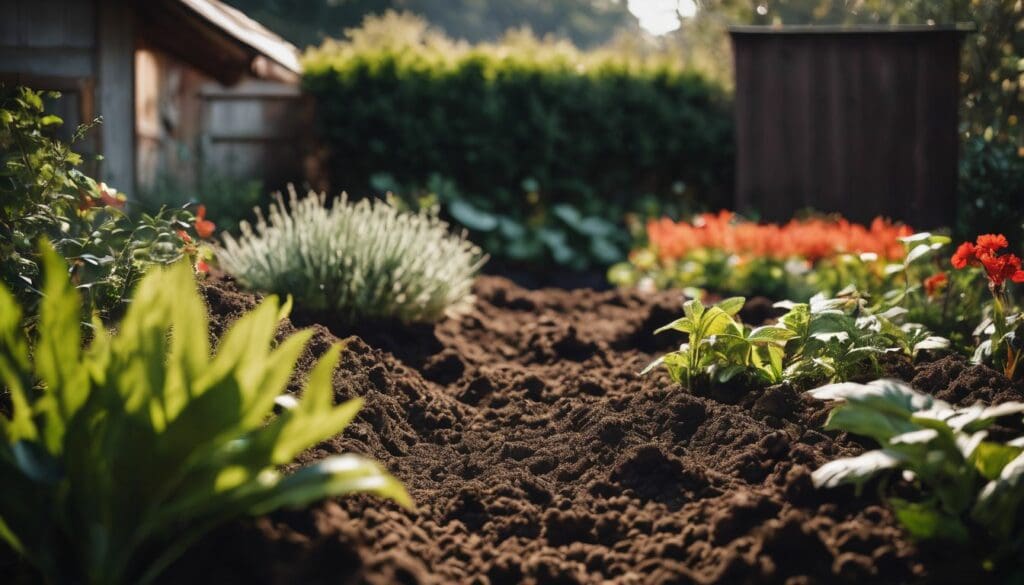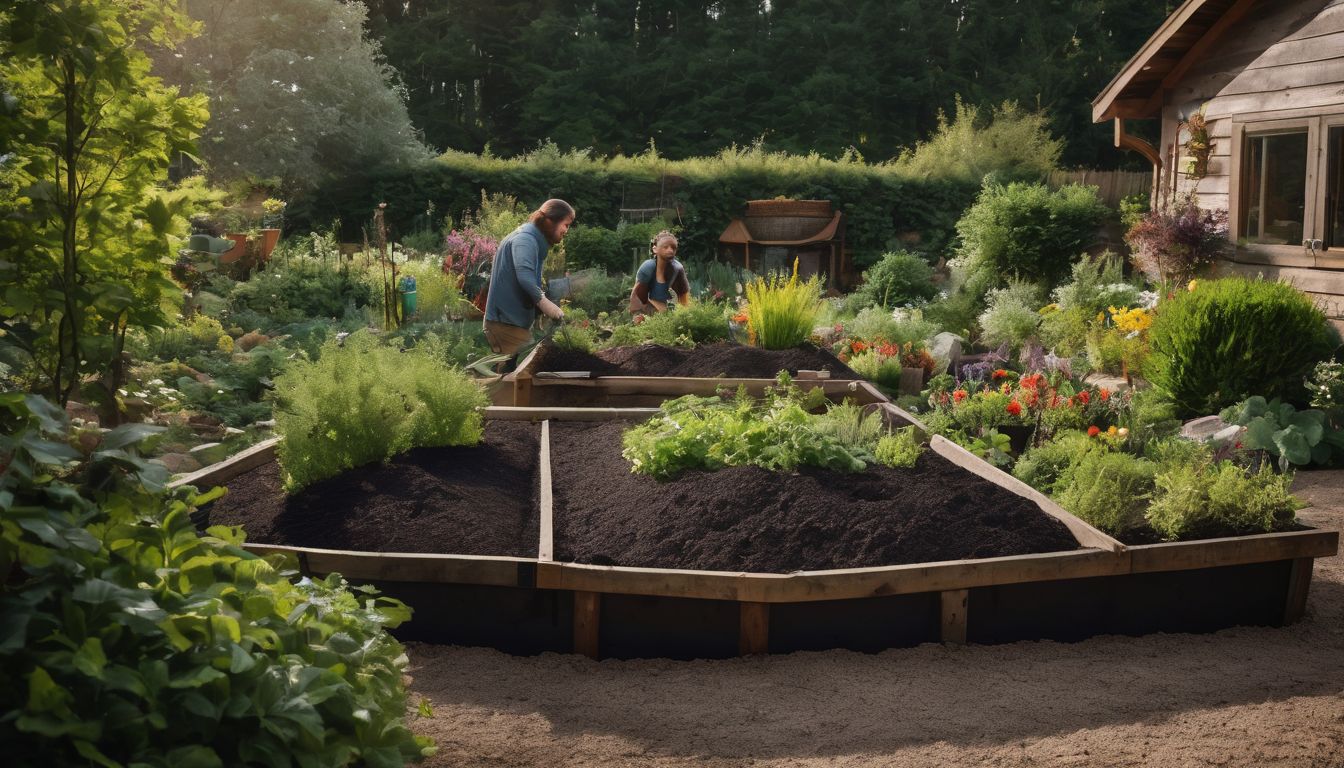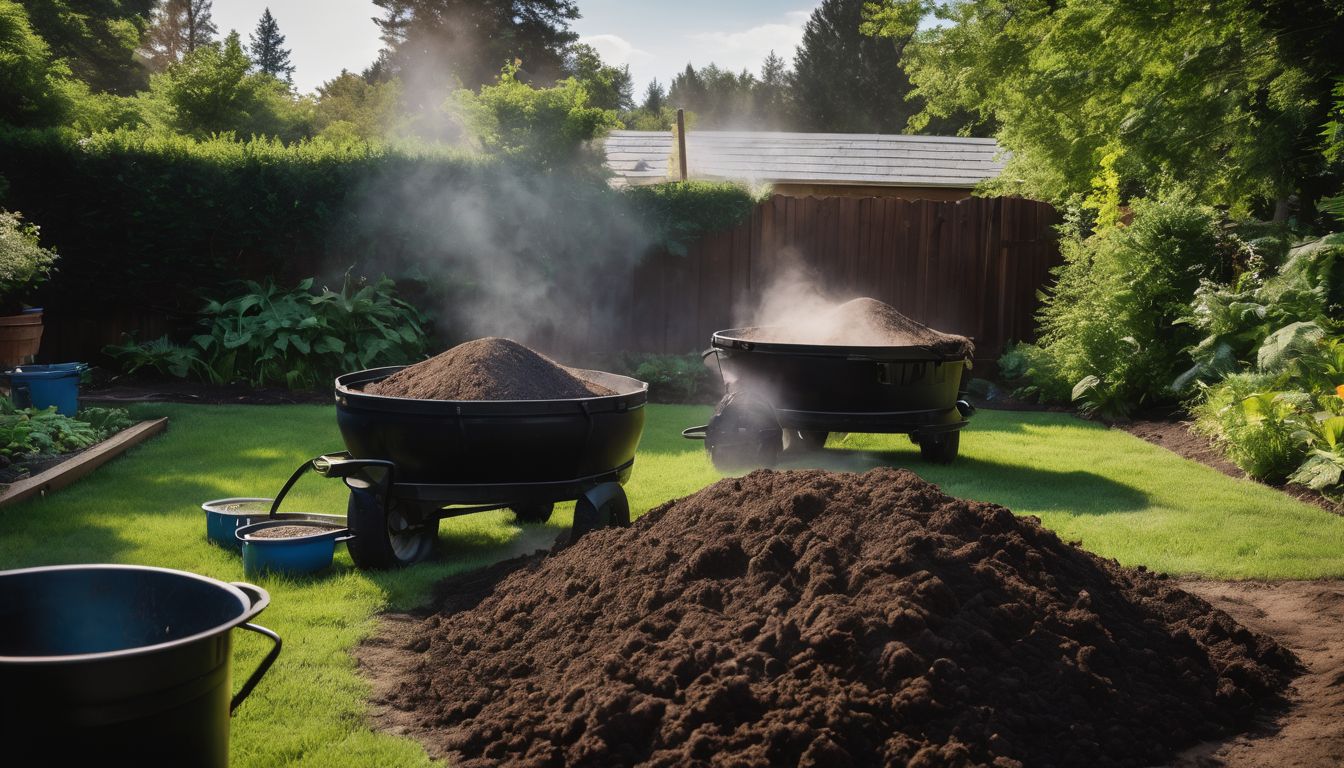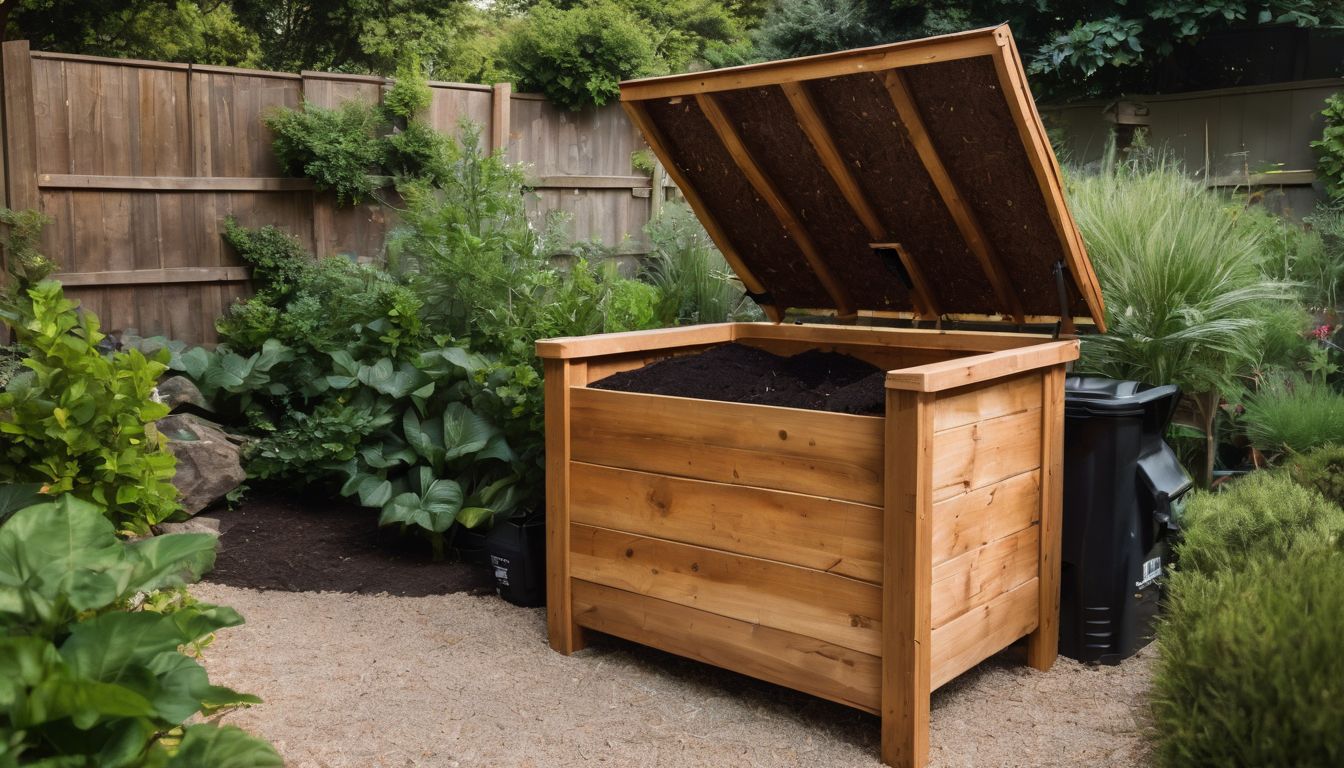If your garden’s soil seems lifeless and parched, you’re not alone; it’s a common struggle for many green-thumbed enthusiasts. In fact, about 58% of the world’s land surface experiences at least one period of severe soil moisture deficiency annually.
Our guide offers practical composting advice to rejuvenate your dirt with rich nutrients and a wealth of benefits. Keep reading to turn your soil from drab to fab!
Key Takeaways
- Composting transforms organic waste into a nutrient – rich soil amendment, enhancing moisture retention, drainage, and aeration while providing vital nutrients for plant growth.
- Employing compost in gardens stabilises pH levels, encourages beneficial fungi development, kills off pathogens and weed seeds, reducing the incidence of pests and plant disease.
- Participating in composting practices benefits the environment by lowering landfill waste and emissions which aids carbon sequestration and helps decontaminate polluted soils.
What is Composting?
Composting transforms organic waste into valuable fertiliser for plants. It’s a natural process where microorganisms break down materials like food scraps, leaves, and manure. This decomposition creates nutrient-rich soil amendments known as compost.
In your garden or green space, composting serves as a cornerstone of sustainability.
The mixture encourages strong plant growth by adding vital nutrients back to the earth. It boosts soil fertility by increasing microbial activity which helps in nutrient cycling. Compost also improves soil structure, making it better at holding water and supporting roots.
Turning kitchen leftovers and garden trimmings into compost keeps them out of landfill sites where they would take up space and release greenhouse gases. Instead of being waste, these organic materials get a new life enriching your garden beds.
By engaging in this eco-friendly practice, you join the cycle of life that sustains healthy ecosystems around us.
How Composting Benefits Soil Health
Composting benefits soil health by improving moisture retention, enhancing drainage, increasing aeration, providing essential nutrients for plants, encouraging healthy fungi, stabilising pH levels, killing pathogens and weed seeds, and reducing pests and diseases.
Improves moisture retention
Improving soil moisture retention is a key benefit of composting. Compost acts like a sponge by absorbing and holding water in the soil, making it more available to plant roots during dry periods.
This helps to prevent runoff and erosion, as well as reducing the need for irrigation, leading to healthier plants with increased resilience against drought.
In addition, better moisture retention also supports vital microbial activity in the soil that breaks down organic matter and releases nutrients for plant uptake. This process enhances overall soil structure and fertility over time, promoting sustainable gardening practices while conserving water resources.
Enhances drainage
Improving moisture retention fosters healthier soil by reducing water run-off and preventing erosion. Enhancing drainage further complements this process, ensuring that excess water is efficiently removed from the soil.
This helps to prevent waterlogging, minimising the risk of root rot and promoting optimal conditions for plant growth. By improving drainage, compost-enriched soils are better equipped to manage stormwater, reducing the risk of flooding and contributing to improved overall soil health.
The organic matter present in compost helps create pore spaces within the soil, allowing water to move freely through it. This not only prevents saturation but also promotes aeration which is crucial for healthy root development.
Increases aeration
Aeration, improved by composting, allows more oxygen to reach plant roots. It enhances soil structure and promotes beneficial microbial activity. Nutrient absorption is elevated due to enhanced root growth and development.
The increased aeration also aids in water infiltration and reduces the risk of waterlogging.
Moreover, improved aeration supports earthworm activity which further benefits soil health through their burrowing activities. These actions help break down organic matter, creating channels for air and water movement within the soil.
Provides essential nutrients for plants
Composting provides essential nutrients for plants, enriching the soil with vital elements needed for healthy growth. Nutrient recycling through composting ensures that plants have access to the necessary nourishment they need to thrive, promoting strong roots and overall plant health.
This natural process contributes to increasing crop yields and supports a robust immune system in plants, aiding in their ability to fend off diseases and pests.
The nutrient-rich compost also helps in water retention, which is crucial for ensuring consistent hydration of plants while reducing the need for excessive irrigation. Adequate moisture levels are fundamental for plant growth and vitality, further underpinning the importance of compost’s role in providing essential nutrients.
Encourages healthy fungi
Healthy soil supports a diverse community of beneficial fungi, which is vital for the health and growth of plants. Composting encourages the growth of these essential fungi, promoting symbiotic relationships between them and plant roots.
This boosts nutrient uptake and enhances plant resilience against diseases and environmental stresses, contributing to overall soil vitality.
Furthermore, healthy fungi in the compost help break down organic matter more efficiently, accelerating decomposition into valuable nutrients for plants. As an environmentally conscious individual interested in conservation and sustainability, supporting healthy fungi through composting can significantly contribute to improving soil health while reducing reliance on chemical fertilisers.
Stabilises pH levels
Encouraging healthy fungi ensures a balanced soil ecosystem, promoting beneficial microorganisms that help stabilise pH levels. This is crucial for plant health and nutrient availability, as it prevents extreme acidity or alkalinity which can hinder nutrient uptake by plants.
Stabilising pH levels also enhances the soil’s ability to support diverse forms of life, further contributing to a flourishing and sustainable environment.
By maintaining stable pH levels, compost supports optimal conditions for plant growth while fostering resilience against environmental stressors.
Kills pathogens and weed seeds
Composting effectively eliminates harmful pathogens and weed seeds, making it a natural method for promoting soil health. This process reduces the risk of plant diseases and minimises competition from invasive weeds, creating a more favourable environment for plant growth.
By harnessing the power of decomposition to neutralise harmful elements, composting contributes to maintaining a balanced ecosystem within the soil.
This leads us to taking a closer look at how composting delivers benefits for the environment beyond what is commonly known as we dive into “Benefits of Composting for the Environment”.
Reduces pests and diseases
Killing pathogens and weed seeds during the composting process reduces pests and diseases in the soil. This natural pest control method helps create an environment that is less hospitable to harmful insects and plant diseases, promoting healthier plant growth.
Composting also discourages destructive nematodes – small roundworms that can damage plants. By managing these organisms, composting contributes to overall soil health by minimising the risk of infestations and infections.
Benefits of Composting for the Environment
Composting reduces waste in landfills and lowers emissions, helping with carbon sequestration and cleaning polluted soils. This benefits not only the environment but also the overall health of our planet.
Reduces waste in landfills
Composting reduces waste in landfills, preventing organic matter from taking up valuable space and releasing harmful greenhouse gases during decomposition. By diverting food scraps, garden trimmings, and other biodegradable materials from landfills into compost heaps, we can significantly reduce the volume of waste that ends up buried underground.
This not only decreases methane emissions but also helps to tackle the environmental issue of overflowing landfills while creating nutrient-rich soil amendments for healthier plant growth.
Lessening the amount of biodegradable waste in landfills through composting reduces greenhouse gas emissions and contributes to a more sustainable environment by addressing issues related to waste reduction and resource conservation.
Lowers emissions
Composting reduces emissions by diverting organic waste from landfills, where it would decompose anaerobically and release methane, a potent greenhouse gas. Instead, through composting, this organic matter breaks down aerobically to produce less harmful carbon dioxide.
By incorporating compost into soil, we can also lessen the need for energy-intensive synthetic fertilisers, further reducing greenhouse gas emissions associated with their production.
Lowers emissions through effective waste management can have a significant impact on combatting climate change and protecting our environment. As environmentally conscious individuals dedicated to conservation and sustainable practices, understanding the emission-reducing benefits of composting is essential in preserving our planet for future generations.
Helps with carbon sequestration
Composting aids in carbon sequestration by capturing and storing carbon dioxide from the atmosphere. As organic matter breaks down, it locks carbon into the soil, reducing greenhouse gas levels.
This process helps mitigate climate change by balancing carbon emissions and absorption.
By incorporating composting into daily practices, individuals can actively contribute to environmental conservation efforts while enriching soil health and supporting sustainable ecosystems.
Cleans polluted soils
Composting effectively removes harmful substances from contaminated soils, improving the overall health of the soil. Beneficial microorganisms in compost break down pollutants, such as heavy metals and pesticides, rendering them less toxic.
This process detoxifies the soil and creates a healthier environment for plants to thrive. Additionally, compost enhances soil structure and fertility, further aiding in the restoration of polluted areas.
Furthermore, this natural approach contributes to sustainable land management practices. The use of compost helps prevent chemical leaching into groundwater by absorbing contaminants within the soil.
Benefits of Composting for the Economy
Composting helps to reduce erosion and lower costs for waste management. It also decreases food costs by providing a sustainable source of nutrients for plants.
Reduces erosion
Composting reduces erosion by enhancing soil structure and stability. The organic matter in compost helps to bind soil particles together, preventing them from being washed or blown away.
This is particularly beneficial for sloped areas or regions prone to heavy rainfall. By minimising erosion, the land retains valuable topsoil, which is essential for healthy plant growth and sustainable agriculture.
Moreover, compost-enriched soil encourages the growth of deep-rooted plants with strong root systems that help anchor soil in place, further reducing the risk of erosion. Embracing composting as a soil amendment not only nurtures healthier plants but also safeguards the integrity of our natural landscapes.
Lowers costs for waste management
Reducing erosion helps lower costs for waste management by minimising the need for costly measures to combat soil loss. Composting reduces the volume of waste sent to landfills, cutting down on disposal expenses and associated transportation costs.
In addition, composting at home or in community initiatives can save individuals and local governments money that would otherwise be spent on waste collection and processing services.
Moreover, using compost as a natural fertiliser decreases the need for chemical alternatives, further reducing costs related to agricultural inputs.
Decreases food costs
Composting can significantly reduce food costs. By transforming kitchen scraps and yard waste into nutrient-rich compost, households can create their own supply of organic fertiliser, eliminating the need to purchase costly synthetic alternatives.
This not only saves money but also reduces the reliance on chemical-based products, contributing to a healthier environment and promoting sustainable living. Additionally, using compost as a natural soil amendment enhances the quality of home-grown produce, further cutting down expenses by reducing the need for store-bought fruits and vegetables.
Furthermore, incorporating compost into gardening and farming practices can lead to higher crop yields without relying on expensive commercial fertilisers or pesticides. This cost-effective approach not only benefits individual budgets but also contributes to a more sustainable and eco-friendly way of producing food.
How to Compost
Composting is a simple and effective way to reduce waste and enrich your soil. You can compost green waste, fruit and vegetable scraps, coffee grounds, and more for a successful composting process.
Different methods like traditional bin composting or worm farming can be used to create nutrient-rich compost for gardening.
What can be composted
You can compost a wide variety of organic materials, including fruit and vegetable scraps, coffee grounds, tea leaves, eggshells, grass clippings, leaves, straw, shredded newspaper, and cardboard.
It’s important to avoid adding meat or dairy products as they can attract unwanted pests. Additionally, steer clear of pet waste and diseased plants that could spread pathogens. By composting these items at home or through community programmes, you can contribute to reducing greenhouse gas emissions and enriching the soil with valuable nutrients for healthier plant growth.
The process involves creating layers of green waste like kitchen scraps and garden trimmings combined with brown waste such as leaves or shredded paper. These layers provide a balanced mix of nitrogen-rich material to break down quickly alongside carbon-rich material that decomposes more slowly.
Tips for successful composting
To ensure successful composting, consider the following tips:
- Choose a suitable location for your compost pile or bin, ensuring it is easily accessible and receives adequate sunlight.
- Layer your compost with a mix of bulky materials like leaves, twigs, and straw along with green materials such as kitchen scraps and grass clippings.
- Turn the compost regularly to aerate it and speed up the decomposition process.
- Maintain proper moisture levels by watering the compost when necessary to keep it damp but not waterlogged.
- Avoid adding meat, dairy, or oily foods to your compost as they can attract pests and slow down the decomposition process.
- Use a mixture of different materials in your compost to create a balanced blend of nitrogen-rich greens and carbon-rich browns.
- Monitor the temperature of your compost pile – it should ideally reach around 140°F (60°C) during the process.
Different composting methods
Composting methods vary, and each has its own benefits and requirements. Here are some popular methods:
- Traditional Composting: Pile organic materials in a designated area, turning and mixing regularly to aerate.
- Vermicomposting: Use worms to break down organic waste into nutrient-rich castings, suitable for smaller spaces.
- Bokashi Composting: Ferment kitchen waste with a special mix of microorganisms that can handle meat and dairy.
- Trench Composting: Bury compostable materials directly into the ground to enrich soil without creating unsightly piles.
- Green Cone: Utilise a solar cone-shaped digester for food waste, which decomposes it while keeping pests away.
How to use compost in gardening
You can use compost in your garden by mixing it into the soil before planting. Spread a layer of compost around existing plants as a nutrient-rich mulch. Additionally, you can create compost tea by soaking compost in water and then using the liquid to feed your plants—a simple method with multiple benefits for your garden.
To maximise the benefits of compost in gardening, consider different application methods such as topdressing, trenching or side-dressing. By utilising these techniques effectively, you can harness the power of compost to nurture healthy soil and promote thriving plant growth.
Next up: “Community Composting Options”
Community composting options
Community composting options are a great way to reduce waste and contribute to healthier soil. By participating in local community composting programs, you can divert organic waste from landfills while producing nutrient-rich compost for gardens.
This not only benefits the environment but also creates a sense of community involvement in sustainable practices.
Neighbourhood composting initiatives provide an opportunity for people to come together and work towards a common goal of reducing greenhouse gas emissions, preventing soil erosion, and increasing crop yields.
Conclusion
In conclusion, composting enriches soil and boosts plant immune systems. This reduces greenhouse gas emissions and prevents soil erosion. It’s an eco-friendly practice that increases crop yields and promotes a healthier environment overall.
By making composting part of our routine, we can contribute to a more sustainable future for generations to come.
FAQs
1. What does composting do for soil health?
Composting enriches the soil, which helps in boosting a plant’s immune system and increases crop yields.
2. Can composting help reduce greenhouse gases?
Yes, by composting organic waste, it reduces greenhouse gas emissions that would otherwise come from landfills.
3. How does compost contribute to preventing soil erosion?
The addition of compost improves soil structure, making it better able to absorb water and resist erosion.
4. Do worms play a role in the composting process?
Absolutely! Worms create worm castings as they break down organic material, which is a nutrient-rich component of healthy soil.





